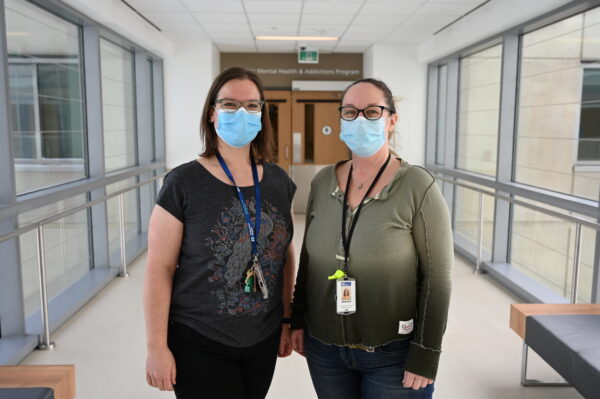Recreational Therapist Month during COVID-19 with Amanda Pipino and Jessica Wackerlin
28
Feb
2021
What is Recreational Therapy?
Jessica: Recreational Therapy is the use of recreation to provide therapy for people who have physical, social, psychological, and cognitive needs. As Recreational Therapists, we use recreation to provide that support in an open and comfortable environment for the individual which makes the therapy more engaging and fun for patients. It is important for patients to find meaningful leisure in their life. We help introduce patients to new activities or reintroduce activities that they did in the past. If they are no longer able to do these activities, we modify the activities or give the patients suggestions of new ones they might enjoy.
What are the benefits of Recreational Therapy?
Amanda: Recreational Therapy is important because often when people get sick the first thing that they lose is their recreation. Recreation is something that is very important for an individual’s overall physical and mental wellness. For example, during COVID-19, many people have developed more stress and anxiety. This increase in stress and anxiety has taken a toll on people’s recreation because it is often overlooked when people have other more pressing concerns. During COVID-19, it is important for people to stay physically active for their heart and lung health.
Services offered by RTs:
- Groups in the gym
- Baking groups
- Art groups
- Gardening groups
- Reminiscence Therapy
- Social skills
- Nail care
- One-on-one support including:
- Helping develop a scheduled plan
- Helping patients build social networks and resources in the community
- Let patients know about subsided recreation activities
How has your job changed as a result of COVID-19?
Jessica: The nature of our job is hands-on so we have had to adapt some of our programs, cancel others and we have also created new groups as a result of the pandemic. Since Humber River Health is a fully digital hospital, we have the opportunity to create new programs such as creating music groups and games/activities via PowerPoint. We have also created activity booklets and crafts for people to do in their rooms to help combat the isolation.
Amanda: The community resources have changed significantly because they have either been canceled or moved online. We now have to encourage patients to use online resources. This change can open up more opportunities because of the convenience of these programs being online, but for others, it is more challenging since they are not getting the social interaction they once had.
We now provide patients with two separate plans. One plan is made for during COVID-19 and the other is customized for when the pandemic ends and more activities will be available.
RTs at-home recreational suggestions:
- Gratitude Journaling – Write down the things you are grateful for 3 days a week for the month of February.
- Forest Therapy – On your next walk to the park or forest, either alone or with family, take your time and slow down, open your senses and immerse yourself in the experience of interacting with the forest or nature in a meaningful and healing way.
- YouTube – Self Care and Improvement – Leisure Awareness from YouTube. Find an activity, which you find interest in. Once you are finished with the activity, evaluate your leisure experience!
Suggested searches:
- Space: https://www.youtube.com/watch?v=53PvDEkgbno
- Dinosaurs: https://www.youtube.com/watch?v=IDkbkvOFxng
- Scuba diving: https://www.youtube.com/watch?v=MIFVtVYfU90
- Skydiving: https://www.youtube.com/watch?v=rTM8vXtdIUA
- Travel: https://www.youtube.com/watch?v=ofZOo4IISiQ
- Roller coaster: https://www.youtube.com/watch?v=8lsB-P8nGSM
- Rock climbing: https://www.youtube.com/watch?v=FRGF77fBAeM
- Tour: https://www.youtube.com/watch?v=8cbYbQKGwoE
Iron Chef – Home Edition – Challenge your partner or family members to cook a meal using only selected ingredients from the fridge to see what they create.

